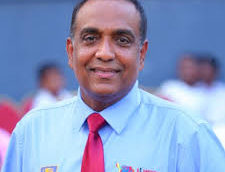
If you were to sit down and make a list of the Sri Lankan players who have served the country with great distinction over the years, ten to fifteen obvious names would spring to your mind immediately. However, not many people from the Emerald Isle have been able to break into the commentary box and make their presence felt among a cavalcade of familiar and revered voices. Roshan Abeysinghe is an exception in this regard.
A middle-order batsman and off-spinner during his playing days, Abeysinghe represented the Ragama Cricket Club at the club level; although he didn’t go on to realize his dream of playing first-class cricket. Instead, he ventured boldly into the unknown territory of cricket commentary, a sphere which has garnered him a lot of appreciation and acclaim in a career spanning over two decades and still counting. Outside cricket, the 54-year old manages a company which is entrusted with marketing two of Sri Lanka’s leading cosmetic brands.
Abeysinghe, who is currently in Sri Lanka as a commentator to cover the ongoing ODI series between Sri Lanka and India, took time off his busy schedule to share his thoughts on the bedraggled state of Sri Lankan cricket at present, his commentary career and life in general.
Excerpts:-
Q: As a commentator, you have been working for nearly two decades now and have seen a lot of Sri Lankan teams over the period. Is the present-day Sri Lankan team the weakest you’ve ever seen?
Abeysinghe: I certainly don’t think that the current team is the weakest. The team comprises some really talented players. It’s just that they seem to be not performing to the best of their abilities, which is a big surprise. But (if this side is) given some time and allowed to play on for a longer duration, they will be a very good side in the future.
Q: What are the factors responsible for this massive downslide of Sri Lankan cricket according to you?
Abeysinghe: We see this gulf between the teams of yesteryear and the current team owing to the quality of the former players who recently moved on. Sangakkara, Jayawardene, and Dilshan will be hard to replace in any team, let alone in Sri Lanka. It naturally takes time for the emerging players to reach the status of the former greats.
Q: Former Sri Lankan captain Arjuna Ranatunga recently called for the sacking of SLC chief Thilanga Sumathipala, accusing him of gambling and raised his concerns over the declining image of the SLC. Do you think such off-field controversies can compound the pressure that’s already mounting on a lackluster team on the field?
Abeysinghe: Firstly, I wouldn’t want to comment on the remarks of Mr. Ranatunga as those are his personal views. I believe as a former captain, it is well within his right to air his views in situations involving cricket and that can’t be questioned. However, as a team when they aren’t performing to the expectations of their fans and the results aren’t the best, it’s only natural that the players will be under pressure.

Q: Over the last fourteen months, as many as fourteen Sri Lankan players, including the likes of Angelo Mathews, Dilruwan Perera, Lasith Malinga, Rangana Herath and Kusal Janith Perera have suffered major injuries which made it difficult for the Lankan management to acquire the services of all its key players at once. Why have the injury prevalence rates risen so much in the Sri Lankan camp at present? Do you think the Lankan team is equipped with additional bench strength to cope with the absence of some of the key players when required?
Abeysinghe: I reckon Sri Lanka’s bench strength is decent. That said, it’s not easy to have someone stepping up to replace a Mathews, a Herath or a Malinga in case they are injured. Hence the bench strength should be viewed accordingly.
Q: Let’s discuss your commentary career now. You have toured many cricketing countries and visited several iconic grounds. Which cricket ground is your favorite and why?
Abeysinghe: Obviously LORD’S and the MCG for their history and what they offer to the game in terms of their standings among the most illustrious sporting grounds in the world.

Q: Sri Lanka has produced a host of cricketing greats over the years and you have seen almost all of them from close quarters. Who is that one Lankan player for whom you could pay anything and travel miles to watch him play?
Abeysinghe: There have been many great Sri Lankan players as you have just mentioned. I am a big fan of Sanath Jayasuriya for the sheer excitement he brought to the game in his heyday, Aravinda (de Silva) for his pure class as a batsman, even though his statistics may not reflect his true worth as a player and the impact that he created in world cricket in his prime. I also admire Sangakkara for his style, finesse, dedication and the accolades that he’s won for Sri Lanka and Muralitharan for putting Sri Lanka on the world map with his bowling feats.
Q: Any funny or amusing anecdote from the commentary box that you would like to share with our readers?
Abeysinghe: (There are) far too many to share as commentating is always fun since you get to meet different people. Their attitudes and standings are so different in the world of cricket and some of them despite their legendary status is extremely funny and likable.

Q: A few Indian commentators like Harsha Bhogle and Sunil Gavaskar have drawn flak from the BCCI from time to time for honestly voicing their opinion about the credibility of a particular player or for not being liberal with their praises of Indian cricket in general. Do you think it is fair to censor commentators who are believed to be neutral individuals?
Abeysinghe: Commentators are always believed to be neutral, though one cannot be blamed for having a feeling for one’s own country or team. The Sri Lankan commentators have never been censored from voicing their opinions on a player or the state of play.
Q: What are the prerequisites for getting into the profession of cricket commentary today?
Abeysinghe: I am not sure what the criteria are! Maybe a qualification could be playing for one’s country. However, I haven’t played for my country despite playing a lot of club cricket in Sri Lanka, which is just below the first-class level. I suppose you should also possess a good knowledge of the game and be a good broadcaster too.
Q: How did you brush up on your communication skills in your younger days?
Abeysinghe: I would say Lord Jesus Christ, whom I worship has been very kind to me and that’s the only reason I have been able to do what I do in the commentary box.
Q: How long do you think can Lasith Malinga, who is already 34 years old, continue to play international cricket?
Abeysinghe: It’s a tough question as only Malinga will be able to answer that. I suppose maintaining a good fitness level and being injury-free are going to be crucial factors for Malinga going forward.
Q: The last question. What can be the remedies to pull Sri Lankan cricket out from swamp waters? Do you think the board members need to be more pro-active as far as the revival of Sri Lankan cricket is concerned?
Abeysinghe: There is no magic formula to improve the state of cricket in Sri Lanka at this juncture, though administrators have their own views. Having said that, if the talent is not an issue as we can see right now, then it all comes down to the proper application and execution of strategies on the field. The lack of it was clearly visible in the first two ODI games against India..







![IPL 2024: [WATCH] Will Jacks Dismisses Travis Head In The Opening Over Travis Head](https://cricfit.com/wp-content/uploads/2024/04/IMG_4775-100x75.jpeg)

![[WATCH]- Rajat Patidar Hits 4 Monstrous Sixes In An Over Off Mayank Markande Rajat Patidar](https://cricfit.com/wp-content/uploads/2024/04/IMG_4770-100x75.jpeg)



